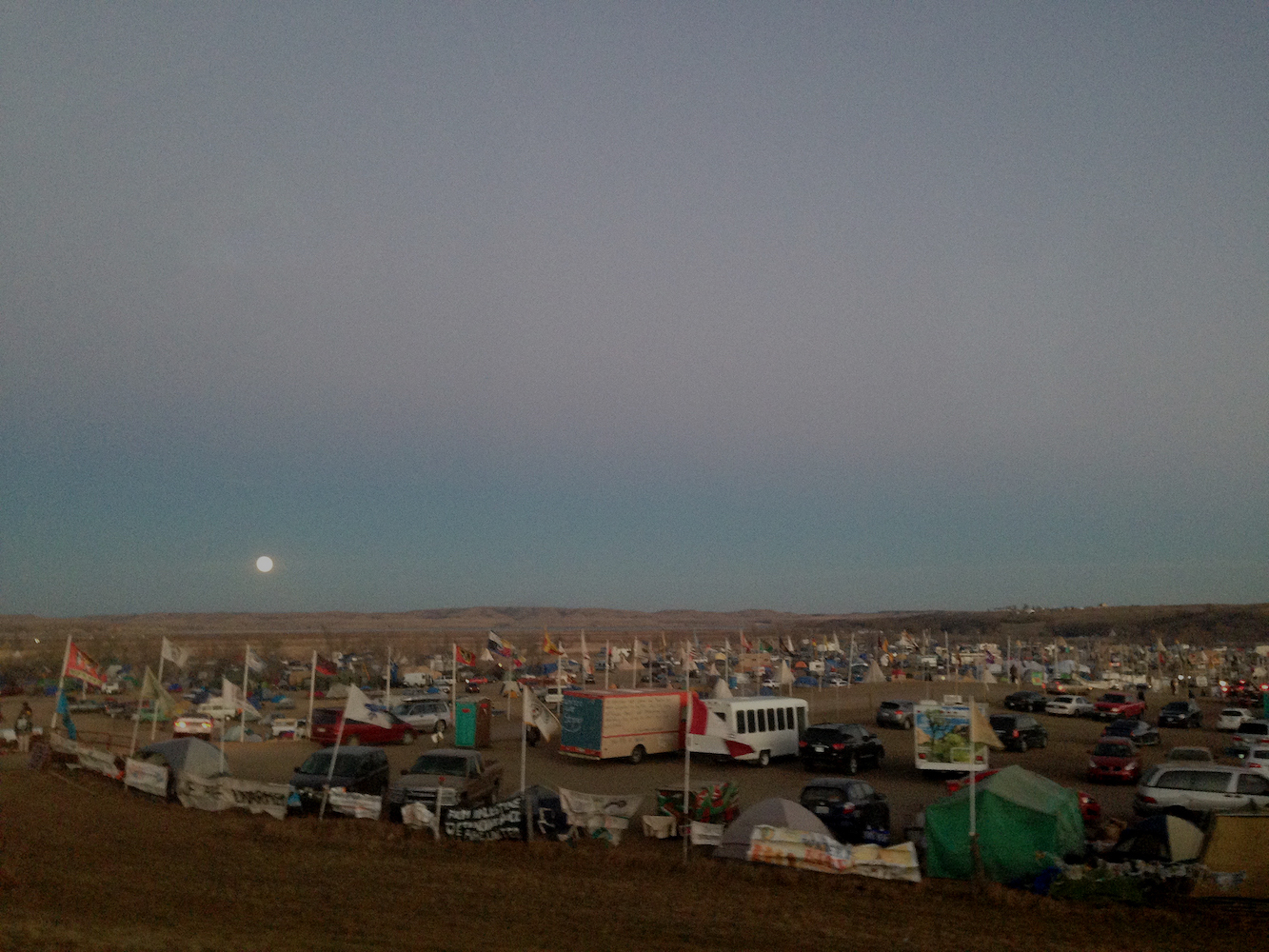We left Marfa while it was still dark—driving north toward the Guadalupe Mountains as the first sunlight appeared across the beautiful high-desert landscape—then on through New Mexico and into Colorado. It was late by the time we found dinner and a hotel near Denver. The Rocky Mountains, obscured at night, were a surprising view the next morning. I felt as if the hours traveled in the dark had been erased from my memory and only with the snow-capped peaks visible could I register where I was. We continued to drive north, across the expansive plains of Nebraska and into South Dakota—on and on, northward, the grasslands rolling out before us.
We were driving to North Dakota to join the Standing Rock Sioux in their historic effort to halt the Dakota Access Pipeline. Donald Trump had been elected two days prior, and while we’d made our plans well before the election, I now couldn’t have been more grateful for the timing of the trip. I kept trying to grasp what had just happened to my country. I felt bitter and sad, numb and full of fear. How would we be able to move forward from this awful moment? As the miles passed, I began to tell myself that I had to start; I had to start right away. And I would start by simply saying “yes,” beginning with this trip, beginning at Standing Rock.
Energy Transfer Partners is the company responsible for the pipeline project in the Dakotas. It is also behind the construction of the Trans-Pecos Pipeline, which is cutting its way through the pristine beauty of the Big Bend region of Texas, where I live. We’ve been fighting Energy Transfer Partners for the past two years, but for me, joining the resistance movement in North Dakota was about standing in solidarity with indigenous tribes whose rights have been ignored time and again by the American government.
It was late afternoon, and we were eager to arrive at camp and set up our tents before dark. We spotted a bald eagle soaring above us, and a short time later we cleared a small rise and Oceti Sakowin Camp came into view. We turned off the highway; the dirt path before us was lined with the flags of hundreds of tribes, majestically waving against the clear, bright, blue sky. Tents and teepees were everywhere, sprawling across the landscape, all the way down to the river.
Early on my first morning at camp, I joined the circle around the Sacred Fire, huddling in the cold, toward the back of the crowd. Various announcements were made over a loudspeaker, and then elders greeted the sun, giving thanks and praying for the water. A group of women gathered and lifted their voices in song and prepared to perform a water ceremony. Everyone was invited to participate, and the crowd began walking, following the women down to the river, singing. I turned away, thinking I should find a task, get to work, figure out what I could do. And then a voice over the loudspeaker said, “Those of you who are new to camp, who just arrived, please follow the women down to the river. We are here to pray for the water. We want you to join in this peaceful, prayerful ceremony for the water.” I turned around and followed them, feeling the awkward self-consciousness of being invited to join in a ritual or tradition that isn’t mine while simultaneously feeling so grateful to be included.
On the banks of the river, amid the large crowd participating in the ceremony, I felt some of my sadness begin to lift and turn into something that felt more like courage. The sun was finally beginning to warm my frozen feet. The surveillance helicopter that was constantly seen and heard, flying low over the camp even at night, now circled over our heads. The procession, the singing, and the praying continued. Many raised their fists toward the sky.
In those moments, I was reminded of the collective strength of solidarity and that I had some powerful lessons to learn and share about patience, community, and taking care of one another. Saying “yes” at Standing Rock was a beginning.
The morning that we departed was very cold. I sipped a cup of hot coffee and did jumping jacks to try to warm up while watching a particularly beautiful sunrise over the river, enhanced by a coat of sparkling frost on the ground. Meanwhile, the port-a-pots nearby were being power-washed, as they were each morning, and the voice on the loudspeaker announced the regular 6 a.m. wake-up. Shouts of “Mni Wiconi” (“water is life”) echoed across the camp. The voice prodded campers from the warmth of their tents, calling everyone to join in prayer at the Sacred Fire, saying “Good morning, Standing Rock! Get up! We are not on vacation!”





